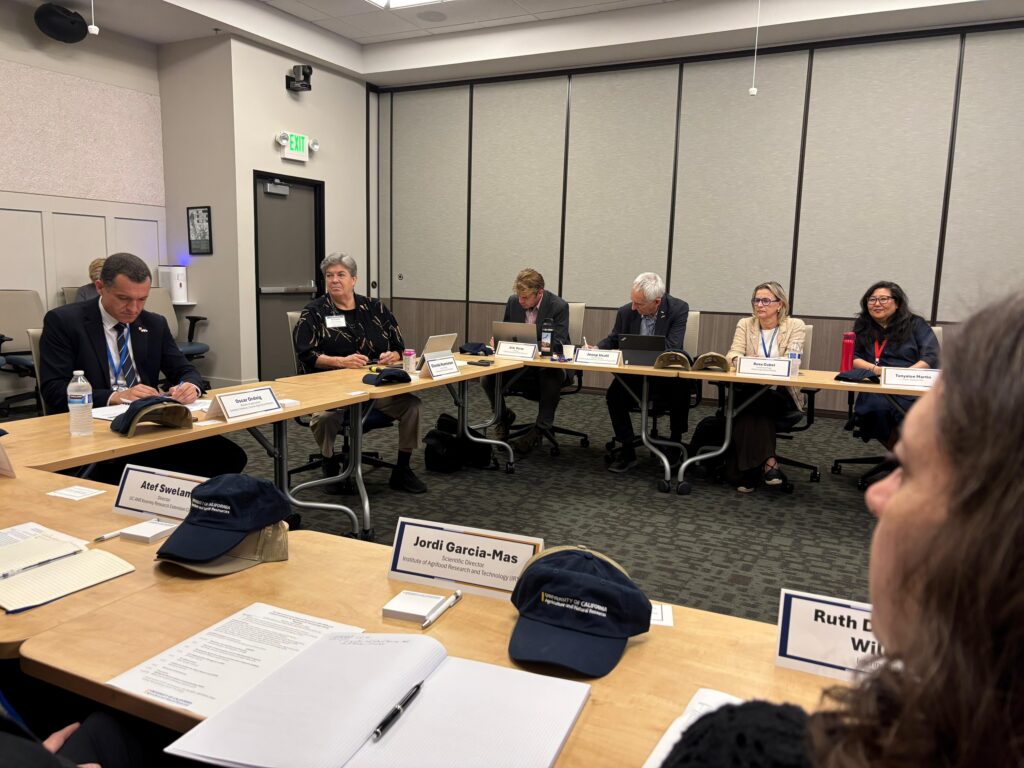
Throughout this week, representatives from IRTA (Institute of Agrifood Research and Technology), accompanied by the Minister of Agriculture, Livestock, Fisheries and Food of the Catalan Government, Òscar Ordeig, are visiting the West Coast of the United States with the aim of strengthening ties with the University of California. Their goal is to collaborate on research and innovation efforts to transform food systems in the current context of climate change.
There’s actually much we have in common. Despite the physical distance, many regions in the Mediterranean basin share similar conditions with California, as well as with Chile, parts of Argentina, South Africa, and even Australia: the so-called Mediterranean climate, which is undergoing changes as a result of global warming.
“Compared to the last century, we now have less water, fewer chill hours, greater temperature fluctuations throughout the day, and we’re exposed to more sunlight,” explains Joan Girona, emeritus researcher at IRTA and one of the key figures behind the first agreements with the American university. Joan Girona is currently in California as part of the IRTA delegation.
Moreover, as Minister Ordeig points out, “for both Catalonia and California, the agri-food sector is the main driver of the economy. That is why we share common needs and challenges that we can address together, from competitiveness to the sustainability of the sector”.
IRTA’s relationship with the University of California began more than 30 years ago, initially focused on research into efficient irrigation water management. Today, “we want to work more intensely and broadly together, opening up our focus to include crop systems, digitalisation, and global health,” says Josep Usall, IRTA’s CEO. Our Scientific Director, Jordi Garcia-Mas, was also part of our institution’s delegation on this journey.
“We aim to deliver new tools and resources to farmers and ranchers in these parts of the world that are especially vulnerable to climate impacts”, emphasizes Glenda Humiston, UC vice president for agriculture and natural resources.

“This trip reaffirms IRTA’s commitment to strengthening its strategic alliance with the University of California, one of the most prestigious and leading institutions in agrifood research worldwide. This collaboration has enabled us to combine knowledge, share talent, and launch high-impact projects that address the major global challenges that the sector is facing,” Usall adds.
Also, throughout the week the Catalan delegation is visiting various Californian companies and institutions in the agri-food sector, as well as Catalan companies established in the U.S., such as Agromillora’s Californian branch, Artesa Winery, or MariMar State Vineyards & Winery.
“Direct contact with agri-food companies from both Catalonia and the United States allows us to closely observe the strategies that have enabled them to grow and establish themselves in highly competitive markets. This exchange provides us with valuable insights that we can apply in our own country, especially in key areas such as on-farm innovation, production organization, and sustainable water resource management,” Usall sumarizes. The modernization of irrigation systems is actually a priority for the Catalan Government.

Climate change directly impacts agriculture and food systems, which must become resilient and embrace new solutions for the future. At IRTA, we are convinced that scientific research, innovative technologies, and forward-thinking proposals are essential to make this transformation possible. We also know we can’t do it alone. That’s why international alliances are a central pillar of our current Strategic Plan.
This visit to California is proof of that. So was last week’s visit to Switzerland, and so is our recent push to commercialize the Tutti apple in China—a variety adapted to climate change and developed over recent decades as part of the Hot Climate Partnership.

Strengthening and expanding collaboration with the University of California will not only involve sharing ongoing research, holding regular meetings to discuss topics of mutual interest, or promoting exchanges between professors, PhD students, and researchers. It will also foster a strategic alliance to communicate the outcomes and opportunities of our research to public administrations around the world, as well as to companies and society at large, as celebrated by Atef Swelam, director of one of the University of California’s research centers, on his LinkedIn account.
“We aim to contribute to the well-being of the Catalan population by ensuring the supply of safe, healthy, and high-quality food. To do that, we must support Catalonia’s agrifood sector in addressing major global challenges, fostering prosperity and generational renewal. We’re very proud to do so alongside the University of California, a world-leading institution deeply rooted in its local territory—just like us,” highlights Usall.
“I am thrilled that the memorandum we have signed will build on the UC’s longstanding collaborations with our friends from Catalonia, for the benefit of communities in both our regions and across the globe“, concludes Humiston.
Finally, you can see how the University of California itself has covered the event on its website: UC ANR, Catalan research institute to spur innovations for agrifood systems


